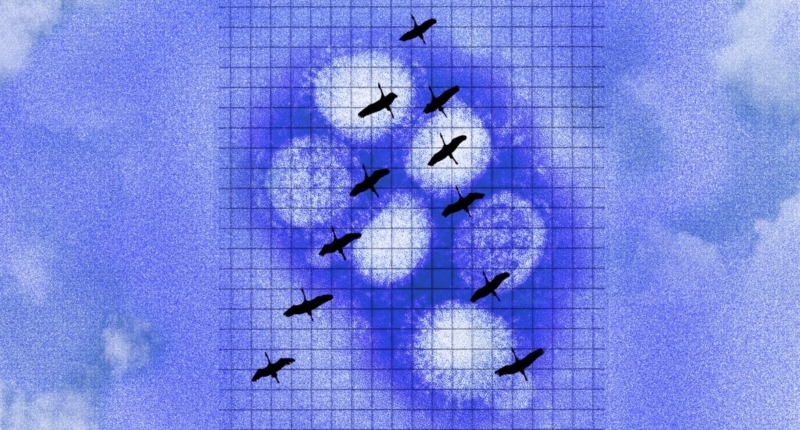US egg prices rose again as experts warn of a surge in bird flu due to the upcoming spring migratory season. While the cost of eggs is a concern, the real danger lies in the possibility of H5N1, the virus that causes bird flu, mutating into a human virus. Vaccination is an option, but the development of a human avian flu vaccine is still ongoing and may take years before approval by regulators. Moreover, bird vaccines only prevent serious diseases and do not prevent the virus from spreading from herd to herd. The challenge lies in administering the vaccine to billions of farmed birds, and no one has figured out the correct dosing strategy yet. As the bird flu problem continues, authorities can only hope for the best as billions of migratory birds take flight this spring.
Bird flu outbreak intensifies as billions of birds migrate
Experts have warned that the H5N1 virus, which causes bird flu, could pose a significant threat as wild birds complete their spring migrations in the northern hemisphere. Last year was already a bad year for the virus, and the risk of infection could increase along the bird migration routes that cross North America, Europe, and Asia. This could affect not only other birds but also various mammalian species that have contracted avian influenza, such as foxes, bears, sea lions, minks, and pigs.
James Lawler, an infectious disease expert at the University of Nebraska Medical Center, said that the increasing migration of birds is a significant issue. Humans are also at risk, and the 2022-2023 bird flu outbreak has already claimed at least one human victim in China over the past year. At least five other people have contracted the virus and survived.
The risk of humans spreading bird flu to each other is raising the possibility of a potential human avian influenza pandemic. Epidemiologists fear that more people could come into contact with infected animals this spring.
The authorities are struggling to come up with a strategy to curb the spread of H5N1, and mass vaccination of domestic chickens, geese, ducks, and turkeys – the only immediate option to reduce the virus’s spread – faces significant logistical obstacles.
The bird flu outbreak appeared to have started in mid-2021 but accelerated in January 2022. However, many people may not have noticed it because of the overlapping virus outbreaks, including COVID-19, monkeypox, and polio.
The virus is spreading far and wide during the 2022 bird migration season. In the United States alone, bird flu has been diagnosed in 47 states, and nearly 60 million wild and domestic birds are affected, according to the US Centers for Disease Control and Prevention. The US poultry industry culled no less than 50 million chickens, geese, ducks, and turkeys in 2022 alone to slow the spread of the virus.
The sharp decline in domestic chicken populations is the main reason why egg prices have increased over the last year. In other words, bird flu is to blame for this.
Rising egg prices as bird flu threat looms
The US egg industry has finally recovered from the 2022 bird flu outbreak, which led to the culling of 50 million chickens, geese, ducks, and turkeys. Egg prices, which peaked at $5.20 per dozen, fell to an average of around $2.40 in January and February. However, the 2023 bird migration season threatens further virus spread and possibly more bird deaths, leading to a rise in egg prices once again.
While the cost of eggs is a concern, the real danger lies in the possibility of H5N1, the virus that causes bird flu, mutating into a human virus. Although H5N1 has not yet spread from person to person, every infection, in animals or humans, is an opportunity for the virus to evolve. If H5N1 were to become a human virus, it could spread among family, friends, and neighbors just like human influenza, COVID-19, and other viruses.
The problem is that experts and officials disagree on how to prevent this from happening. A nationwide vaccination could help, but human avian flu vaccines are still in development and not yet ready for human trials or approval by regulators. Even in the most optimistic scenario, it could take years before a bird flu vaccine is available for humans.
Bird vaccines already exist, but they only prevent serious diseases and do not prevent the virus from spreading from herd to herd. Improved bird vaccines that prevent transmission have been under development for years, and last month, the US Department of Agriculture announced that it would test the first of these new vaccines. However, it is uncertain how long the testing and authorization process might take.
Administering the vaccine is another challenge. It is impractical to vaccinate wild birds, and even farmed flocks pose a challenge, with the US having 2 billion domestic chickens and hundreds of millions of geese, ducks, and turkeys. No one has figured out the correct dosing strategy yet.
While the risk of human-to-human spread of bird flu is low, it is not impossible. A large outbreak of bird flu in swine could increase the risk, as they are usually involved in creating new strains with a higher risk of human-to-human spread. The highly lethal nature of H5N1, which kills over half of the people it infects, underscores the need to prevent it from becoming a human virus.
Experts stress that they do not know enough to predict the risk of a major avian flu mutation accurately. However, it is clear that prevention measures, such as vaccination and improved bird vaccines, are necessary to reduce the risk of a potential human avian influenza pandemic.
Challenges in implementing a bird flu vaccine strategy
Implementing a vaccine strategy to prevent the spread of bird flu is challenging, as there are many factors involved, from vaccine development to production schedules to herd distribution. The US Department of Agriculture is currently testing a new bird vaccine, but it is unclear how it will be used or administered. Experts suggest that adding vaccine to birdseed could work, but it would require experimentation to determine its effectiveness. Regardless, it is unlikely that the bird flu problem will be solved this year, and authorities can only hope for the best as billions of migratory birds take flight this spring.
Don’t miss interesting posts on Famousbio









